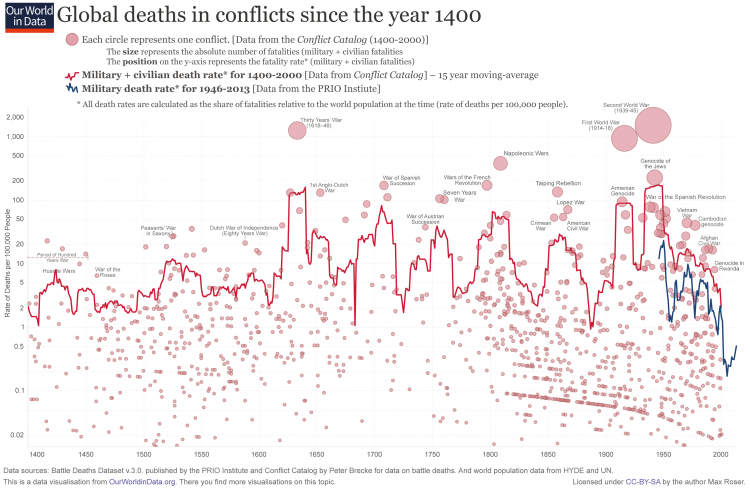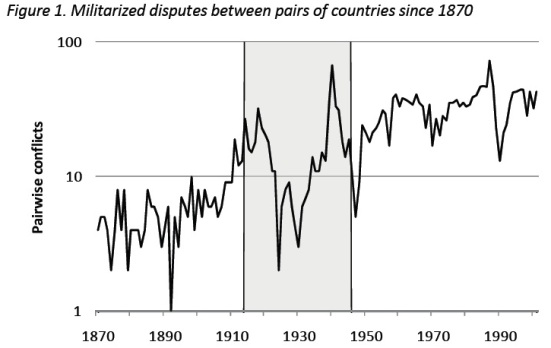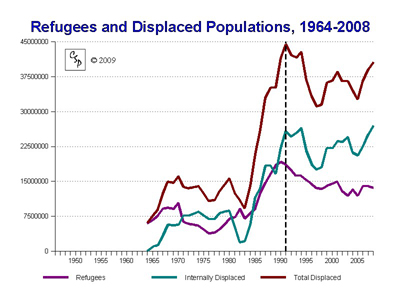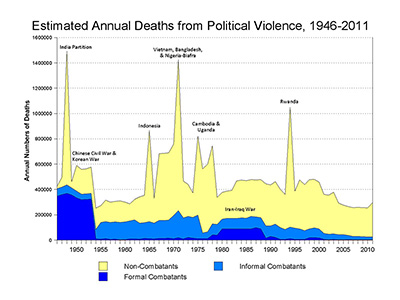K. A. Pital wrote:
I think you do understand my argument, you just want to make a strawman out of it so that it could be better knocked down.
Yup. I'm the one strawmanning your argument. The one you change every time it's challenged. The one you allude to until it gets challenged. The one where you refuse to acknowledge that you flat out responded to claims by multiple people by disputing an argument they never made.
Let's take several examples, some from a time where there was rivalry between the blocs, and another from a different time when there is just one dominant bloc.
The first example doesn't address my argument at all, because I've been very clear that the unambiguous stabilizing effect of NATO is post Cold War. The Cold War era Saw the blocs regularly fighting proxy wars to avoid direct conflict. It was an extension of the alliance system of the 19th and 20th centuries.
First, Vietnam.
Was fucked by competing alliances over 150 years. Has had rapid economic improvement since that conflict ended. Vietnam benefits greatly under the single super-alliance system. Because under the colonial system it got directly raped and pillaged. Under the competing superpowers system it became the ground for a proxy war that raped and pillaged it further to the point of it having its very own migration crisis.
Under the single superpower it has rapidly improved people's lives.i was very specific about the conditions that were beneficial. By pointing out how badly Vietnam fared under the prior systems, you once again make my point for me. Thanks.
Second, Iraq. There were some voices against the war, but nobody was resolute enough to put anything on the line for Iraq. France and Germany voiced discontent, Russia was dead against but also did not want to risk anything. There was no one to run to - Iraq was invaded in an atmosphere of total NATO dominance, with no serious armed detractors who could help the invaded nation to pose a challenge.
So... Iraq is an example of why the single superpower alliance system is bad because it didn't become a proxy war like Vietnam or Korea or most of Central America.
You won't find me defending the Iraqi invasion. Or most of the policy in the Middle East in the NATO period. But it is a perfect example of a place that was going to be badly unstable no matter what the geopolitics. It's got a shy hand of one very valuable natural resource and not much else. Countries in the Middle East are all economies which have difficulty diversifying, and it makes them inherently unstable.
But more than that, if you think that the involvement of an additional great power on the opposite side of Iraq would have improved the outcome, that...aybe you're saying it never would have happened with a multiple alliance system, but you can't be dumb enough to think shit like that wouldn't happen, just with an additional wrinkle that fuels the fire even more.
The problem that I am talking about, one of the union of WMD-armed industrialized nations stomping on lesser ones with them having little or no recourse, is not going away because you unite all such nations into one bloc, but it is actually becoming worse by some metrics.
But not, again, the metric of the number of people killed in warfare per capita. Or the number of people among the global poor. Or any metric you can actually, you know, measure. But it certainly
feels worse if you have a certain philosophical position.
There is only total despair if you are on the receiving end of the attack in such a case, and nobody to run to. Over the decades, powerful nations managed to unite in such a way that the entire "developing" world is a potential warzone - first you designate some country a "pariah state" and then you do what you like with it. The likelihood of war between rich nations subsided, but the likelihood of being fucked over by them? Not by much.
Oh bullshit. This is a detailed report on the number of war deaths since 1400:
https://ourworldindata.org/war-and-peace/
The 20th century is probably when it starts to be useful data. Funny thing about the period after 1990, even with the middle eastern fuckery.
Unless you're calculating "likelihood of being fucked over by them" by "whether some guy who happens to believe the West is wrong no matter what they do, and happy to change his argument depending on how full of shit everyone else realizes he actually is, believes they have a higher chance of being fucked over" and not "whether they actually get fucked over at a higher rate by real measures".
It's cool, though. I look forward to you explaining that you never actually made the argument that the likelihood of being fucked over by the great powers is increased and accusing me of strawmanning you in reply. Your goalposts are basically on wheels.
That is a good argument. But it is related to economy alone. Once you have a gigantic economy like China or India, who can also consume the products of poorer countries (and in this century, they are starting and they will) - the utility of NATO in that regard rapidly decreases.
The argument is that NATO, by keeping major economies from fighting, increases economic power, which further reduces the likelihood of major economies fighting. The only way the utility of NATO decreases at all for this purpose is if enough of those new large economies develop tense relationships with NATO form a bloc of their own that can actually challenge it, and we get back to proxy wars which risk developing into full-scale global nuclear war.
And frankly, I'm being generous by assuming that your statement "But it is related to the economy alone" isn't a contention that the economic benefits of the bloc aren't related to its broader geopolitical stabilizing effect.
The argument also suffers from a certain inherent weakness ("without the aristocracy, who would consume the products of the craftsmen? workshops would go bust!")...
Only if you're ideologically predisposed to see all of history at all zoom levels as a zero-sum continuation of one guy's interpretation of 19th-century class struggle where the rich entities are all trying to keep down the poor just because they're poor.
Not nothing, but little to do with it. If there were no WMDs, the alliance would crack much sooner, as war would be less risky and taking chances against a conventionally outmatched enemy, or even taking chances due to sheer miscalculation (Hitler massively overestimated the industrial potential of the Reich) - is going to happen again. Without the huge risk posed by WMDs, war would be a lot more common and alliances would be a lot more fragile.
Without a null case, there's really no way to be sure, is there? It would certainly be necessary for that to be true in order to justify your argument, such as you have one. And there is some truth to the fact that nuclear deterrence is a major component of the alliance that has a pro-stability effect.
But just two nuclear-armed blocs in a game of deterrence resulted in higher combat casualties than we experience currently and at least two separate instances where either momentarily-heightened tensions or normal tensions combined with incompetence nearly broke nuclear deterrence (along with the world).
If there were three or more rival blocs of equal strength all armed with nukes, I have no doubt we'd be debating the relative merits of the smoking irradiated crater method of enforcing geopolitical stability. That there hasn't been a near-nuclear war since the fall of the Soviet Union is a strong argument for the single superpower bloc stability theory.
I had a Bill Maher quote here. But fuck him for his white privelegy "joke".
All the rest? Too long.





